But this time watching it was different. Not because I suddenly discovered something about the movie I didn't like, but rather the exact opposite. As I was watching it, I was filled with a sudden realization of why exactly I love this movie so much. I realized that Sister Act is more than just a spectacularly good comedy about witness protection and Whoopi Goldberg's singing voice. It's actually an analysis of all of the failings of the modern church and Christian culture mixed in with a clear path to rectify those things. And songs.
And all of a sudden, as I realized this, I saw why this film meant so much to me growing up. Because, make no mistake, I cannot overstate how much this movie meant. I seriously considered taking Holy Orders because of this film and I'm not actually Catholic.* This movie informed so much of who I am and who I aspire to be for one simple reason: it wasn't trying to make me feel good about my faith. It was just trying to tell the truth.
For my readers who aren't deeply invested in any particular faith community, I have to say, today's article isn't really for you. You're still totally welcome to read and all, but bear in mind that today I'm talking to the religious peeps out there. You know who you are. I'm talking about the ways in which faith culture, specifically Protestant Christian culture, has a lot of problems, and how Sister Act can show us how to solve them. Or at the very least how to diagnose them. So. Here we go.
Sister Act is a comedy released in 1992 that stars Whoopi Goldberg and Maggie Smith going head to head in a battle over what it means to be a faith based community. The actual plot of the film is blissfully ridiculous and oh-so nineties. Goldberg plays Deloris von Cartier, a lounge singer at a terrible hotel in Reno, Nevada. Deloris is vaguely unhappy with her life, career, and relationship, but doesn't have any clear answers about what to do. Then she stumbles upon her (married) boyfriend, Vince LaRocca (Harvey Keitel), shooting a guy. Because Deloris' boyfriend is actually a mob boss. Whoops!
So Deloris runs for her life and is entered into police custody, overseen by Detective Eddie Souther (Bill Nunn), the only honest cop on the force. He puts her in the last place anyone would look: a convent.
And so our hijinks ensue. Deloris, who is, I should remind you, a lounge singer dating a married man, is unprepared for convent life. But just as much, the convent is unprepared for Deloris. Her cover is that she's a transferred nun, and only the Mother Superior (Smith) knows who she really is.
So obviously silliness happens when the other nuns assume Deloris knows how to do the traditional prayers and all that and when Deloris assumes the other nuns have ever heard of pop culture. In both cases the assumptions are wrong, of course.
Mother Superior's main goal throughout the film is to keep Deloris, who now goes by Sister Mary Clarence in the convent, isolated from the other nuns so that she won't infect them with her vulgar, worldly ways. But the other nuns really like Sister Mary Clarence (Deloris), so they befriend her anyway. They even, upon discovering that she can sing, persuade her to take leadership of their choir. Because they suck.
And it's through this choir that Sister Mary Clarence starts to actually change the convent and is changed in return. While her most significant contribution at first is just managing to teach the women to sing in key, she also reminds them that singing isn't about "quacking" it's about making a beautiful noise unto the Lord. And when the nuns finally debut their new musical abilities at mass, the congregation is stunned not just by the vastly improved quality of their singing, but by the joy and fervor of their hearts.
Like, seriously, they sing so much and so well and with such funky groove (it was the nineties, I feel the need to point out) that people come into the old church just to see what the hell is going on. Young people. Neighborhood people. People who wouldn't otherwise come to church.
This sets the story off on an explosion of color and excitement. Deloris/Sister Mary Clarence uses this impetus to spark a change. She gets the nuns to take down their very literal walls and chain link fences, clean up their part of the street, and start inviting people inside the church. While they practice and focus on making the choir excellent and their music a true reflection of their devotion to God, they also admit that there needs to be some outpouring of that love on the community too.
After all, Jesus said very clearly that we are to honor everyone. If we believe that Jesus wasn't lying, then that means that we are to honor people in very practical and helpful ways. The nuns fix up the outside of the church and start serving food to the hungry in the neighborhood. They start a community playground for kids. They actually talk to the people in their community and befriend them.
And the results? Freaking spectacular. The community responds by lavishing love on the church. The "fix the church roof fund" finally reaches completion, but more than that, the seats are packed every week for mass. People are kinder to each other. They care. And they are devoted to this place and these people who first honored them.
Crap. Hang on. Making myself tear up. Gimme a minute.
Okay. So obviously there's more to the story than this. Eventually, Vince catches sight of Deloris in one of these news reports on the nuns and tracks her down. His goons kidnap her and take her to Reno so they can kill her, but the nuns rally and come after her. Especially Mother Superior who, having been devastated that Deloris could turn this parish around in just a few months after she tried for decades, has decided to embrace her instead of turning away.
Naturally the nuns come and they save Deloris and Vince get's captured and everything is awesome.
They even get back in time to sing for the Pope. And while Deloris is finally exposed as not a real nun, no one really cares. It's not like she isn't their friend, like she isn't an amazing woman who did a lot for their hearts.
The film is admittedly vague on where Deloris herself ends up in terms of faith, but frankly, that's never bothered me. She doesn't become a nun, because that would be too easy, but I can't imagine Deloris comes out of that experience without some appreciation for faith.
Better than that, though, the fictionalized accounts of how Deloris' desire to positively impact her community changes lives are a really good roadmap for how the church ought to act. Having grown up in the church, I definitely related to the idea that we were in some secluded cloisters, kept away from the world, with big walls to keep the world out and keep it from "infecting us."
Like, seriously, the way that Mother Superior treats Deloris at the beginning, keeping her away from the other nuns and making her shut up any time she tries to share about "controversial" topics, is extremely similar to my own experience in the Christian community in high school and college. I was "subversive" and "dangerous" and way too comfortable talking about sex and television and being friends with drama kids. There's this pernicious idea out there that we as Christians need to be afraid of the world. That the world is going to somehow get us dirty and make us bad.
Which is complete and total crap. For the record.
I mean, if you actually believe what Jesus says, then we as Christians and people of faith shouldn't afraid that the world is going to get us dirty. The world should be afraid that we're going to get it clean. Or something. That metaphor doesn't work super well when you turn it around.
But you get my point! This idea that we need to protect ourselves from secular culture is just complete bullshit. If we really believe in the sovereignty of God, then how could secular culture ever hurt us? Aren't we supposed to be out there engaging it? Making it better?
I have strong feelings about this because, well, that's what I do. This is my life mission. I engage with culture because I see it as representing people badly. I think that the media by and large doesn't do people justice. It doesn't honor them. So I complain and yell and blog and try to make it clear that we should not accept a culture that makes anyone feel like less than they are. And who are they? A glorious creation of God, to be honored and cherished.
Sister Act has a lot to do with that. It gave me a picture of what it can look like when we do open the doors and tear down the walls and engage. But more than that, Sister Act provided a vision of a two-pronged approach to faith and revival. Because before the nuns could love the people of their community lavishly, Deloris had to help them remember how to love their God lavishly. Like, that's a huge part of it. People were intrigued to come in because they heard the nuns worshipping with absolute abandon. That's not nothing, guys.
And finally, it's worth noting that Sister Act is also a searing indictment of Christian culture's whiteness. I mean, it's weird because the actual majority of Christians in the world are non-white (I mean like, a massive majority), but Christian culture, especially Conservative Christian culture is predominantly white and upper-middle class.
We can see this represented in the film with Maggie Smith as the Mother Superior. The older white woman who stands for the status quo and the way things always have been. It's implied that St. Katherine's (the parish in the film) is in an older neighborhood that used to be all Irish Catholic but has changed over the years. It's more diverse now. Full of not-white people. And Deloris, for all of her sinful ways, knows a lot more about what it means to minister to those people than Mother Superior does. Deloris knows because she's been them.
This is important because as Christians we can start to get to thinking that race and class and gender don't matter, all that matters is your relationship with God. And that's true. To an extent. But it's also important to remember that race and class and gender play huge roles in people's lives, and to ignore that is to ignore the fullness of who those people are. We cannot get so bound in to the idea of a white Christian culture. We need to embrace the actual diversity of the church, because only then can we genuinely impact people's lives. Diversity is good. Embrace it.
The bottom line is that I've spent a lot of years being really unhappy with the church. Not my church specifically, but the church, the big concept of all Christians bonded together in God. I've been unhappy with it because I felt like there were walls and rules and not enough love for Jesus. I'm not saying Sister Act is the perfect movie. It's not. But I am saying that watching it has given me a very clear idea of how to change the church, how to make it closer to what Jesus calls us to. And that's really important.
Plus, the songs are awesome.
 |
| Shoutout to Kathy Najimy and Wendy Makkena for being the cutest nuns ever. |
*I was raised non-denominational Evangelical Protestant - with a dash of Messianic Jew for flavor. Makes for really interesting holidays.

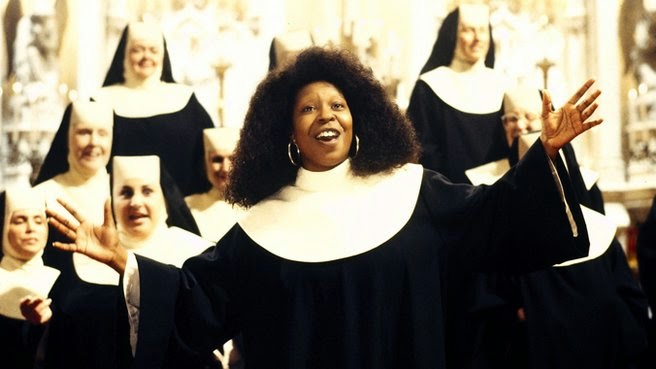
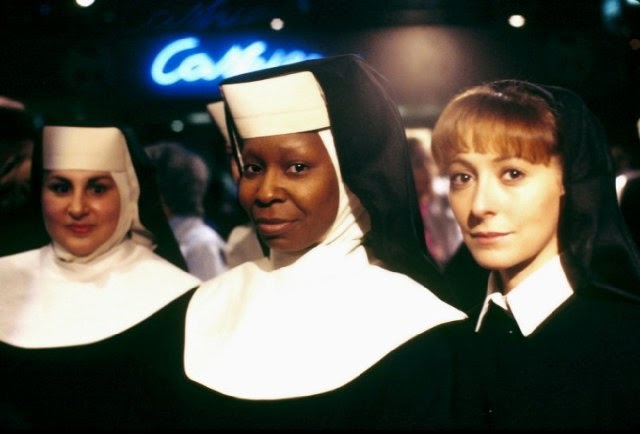

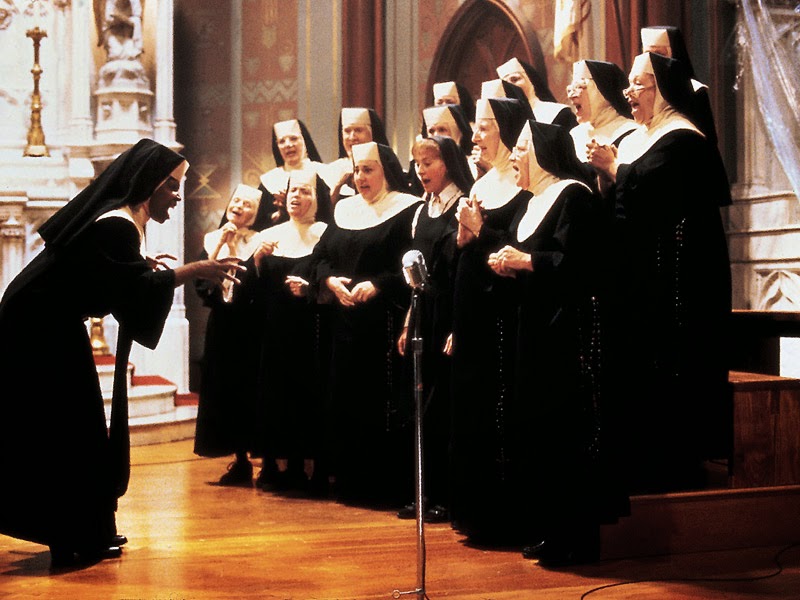
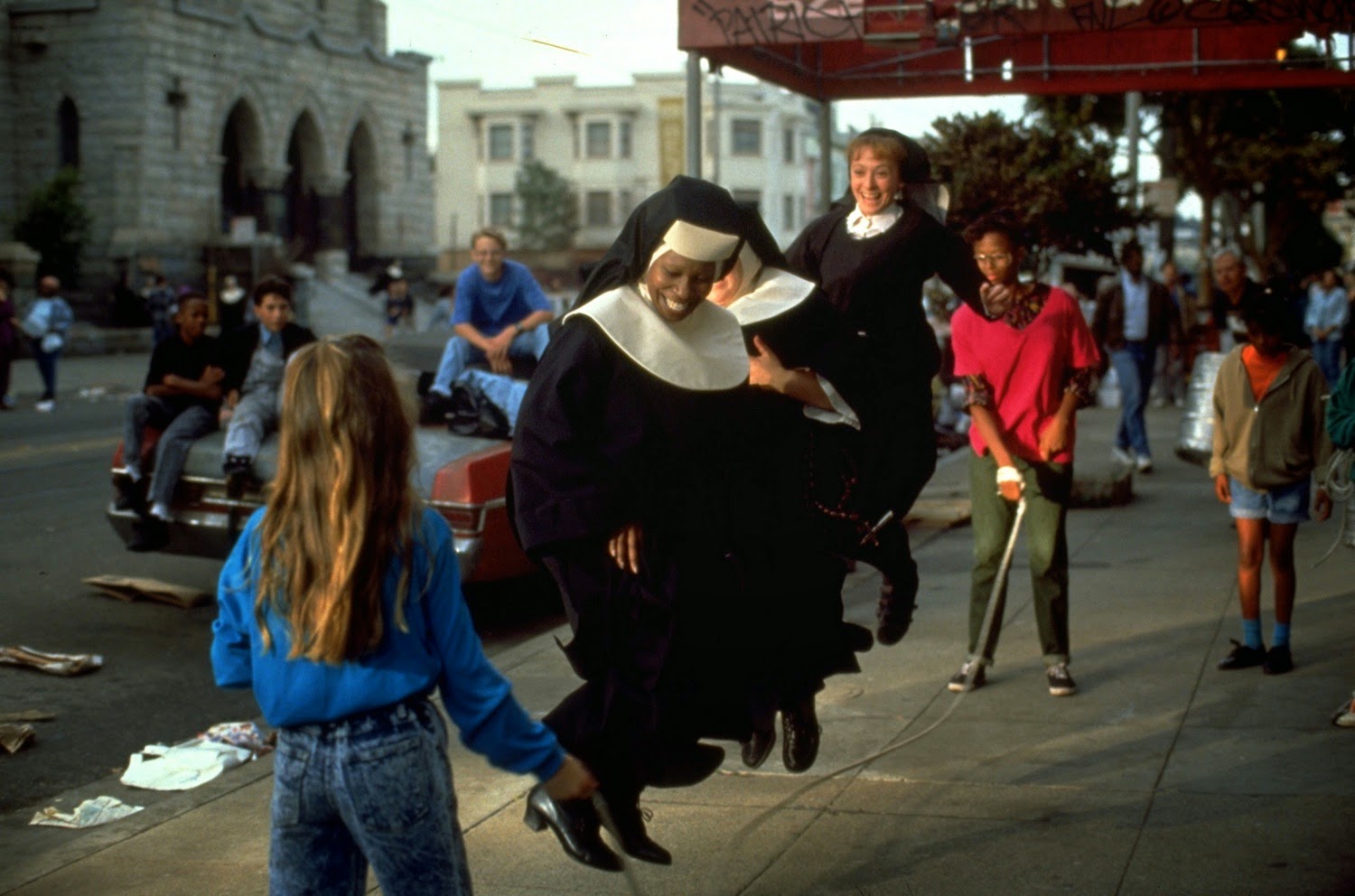
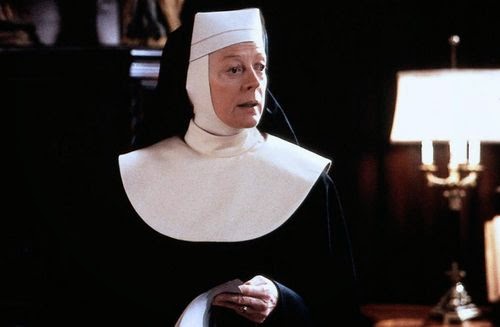
*RESOUNDING APPLAUSE*
ReplyDeleteCan I applaud your applause? Is that a thing? :DD
Delete<3 love <3
ReplyDeleteYou inspired a lot of this, you know.
DeleteThank you so much for sharing this - I love your insights! I am actually writing a sermon on Spiritual Gifts as seen in Sister Act, and your explanation furthers and strengthens my analogy. I hope that you have found a faith community like the one Delores helped create :)
ReplyDeleteKOLKATA ESCORTS
ReplyDeleteKOLKATA ESCORT
KOLKATA ESCORT SERVICE
KOLKATA INDEPENDENT ESCORTS
KOLKATA INDEPENDENT ESCORT
ESCORT IN KOLKATA
ESCORTS IN KOLKATA
VILLAGE CALL GIRLS
VILLAGE CALL GIRL
CALL GIRL
CALL GIRLS
ESCORT
ESCORTS
KOLKATA FEMALE ESCORTS
KOLKATA HOTEL ESCORTS
KOLKATA MODEL ESCORTS
KOLKATA CALL GIRL
KOLKATA CALL GIRL SERVICE
KOLKATA CALL GIRL SERVICE
KOLKATA CALL GIRLS
CALL GIRL
CALL GIRLS
CALL GIRLS SERVICE
CALL GIRL SERVICE
KOLKATA INDEPENDENT CALL GIRLS
KOLKATA INDEPENDENT CALL GIRL
ESCORT
KOLKATA ESCORTS
KOLKATA ESCORT
KOLKATA ESCORT SERVICE